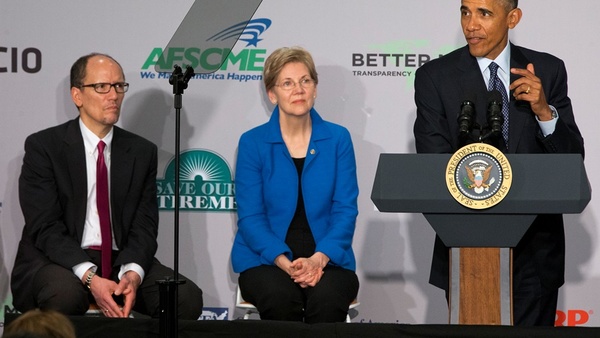Obama calls for more drug treatment, cybersecurity funding in final budget
The budget includes a $4.1 trillion spending plan for the coming year, and also proposes to eliminate $2.9 trillion in spending over the next 10 years.
But it’s unlikely the GOP-dominated Congress will pass all – or even most – of the proposal.
The budget will seek a largely budget-neutral upgrade of the unemployment insurance program, $1 billion for cancer research, $1.1 billion for prescription pain medication and heroin addiction treatment, a $10-a-barrel oil tax to pay for transportation improvements, a doubling of clean energy research funding, and $19 billion to shore up the government’s cyber defenses.
Even before Obama released his plan, Republicans including House Speaker Paul Ryan criticized it as too expensive and pledged to block Obama’s agenda.
Although there is little chance that the budget will be passed in the Congress, there are some areas that the White House and the Congress can agree on, such as funding for cancer research and expanding the Earned Income Tax Credit to childless adults.
Unveiling the draft in Washington on Tuesday, the White House also said it expected steadily increasing budget deficits, after several years of reduction.
The budget sees the economy growing at a 2.6 percent rate this year, though administration officials noted that projection was finalized in November, prior to the recent stock market slide.
On the other hand, the White House said that by cutting tax loopholes and special breaks for the wealthy, reforming business and capital gains taxes, and adding a Dollars 10 a barrel tax on crude oil, the deficit can be held below three percent of GDP without hurting the USA economy with hefty spending cutbacks.
Now he puts forth a budget for the 2017 fiscal year, which begins October 1, that calls for $4.15 trillion in spending, a $223 billion increase over the current year’s budget.
The proposal comes after the non-partisan Congressional Budget Office estimated soaring deficits and debt for the next decade.
Republicans have long complained that Obama has failed to attack the chief cause of future deficits, the soaring cost of entitlements.
Numerous new policy proposals in the budget were already announced since Obama’s State of the Union address last month.
In a presidential election year to pick his successor, the Democratic president is proposing programs sure to appeal to supporters of the eventual Democratic presidential nominee and likely opposed, at least in part, by the Republican candidate.
After a series of embarrassing high-profile breaches, the USA federal government has been working to secure its system.
The money included a $3.1-billion Information Technology Modernisation Fund to retire, replace, or modernize antiquated IT infrastructure, networks, and systems “that are expensive to maintain, provide poor functionality, and are hard to secure”.
“The budget that we are releasing today reflects my priorities and the priorities that I believe will help advance security and prosperity in America for many years to come”, hed said.
“While the budget calls for a number of necessary security enhancements, it still falls short where we need it most… the president’s overall budget still proposes spending billions more on countering climate change than on countering violent extremism here at home”.








